Amassive thunderstorm ripped through Taipei on Friday afternoon threatening to short circuit Formoz 2001 -- Taiwan's first hardcore rock festival -- before it even started. But by 5pm, the sky had cleared, dispelling the organizer's fears.
Taking place at Hwashang Arts District (
Saturday afternoon was dominated by the all femme cutie-punks Softball from Japan. The grrrls showed that they weren't just pretty faces, making a nod to local political history with the third track on Just Try It, their latest album -- titled 0228 after Taiwan's 228 Incident. A pity that the lead singer's guitar kept falling down like a loose bra strap.
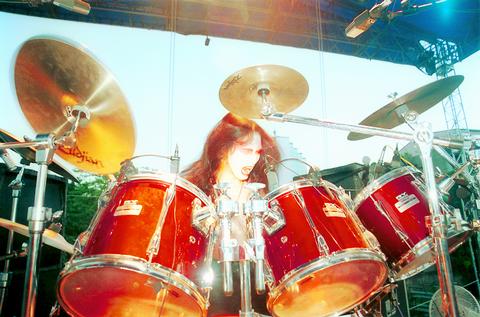
Later Magane took over the outdoor stage, whipping themselves and the crowd into a frenzy. The influence of Brit heavy metal glam rockers Kiss was quite obvious in their music and make-up. Japan's three girl hardcore act, Yellow Machine Gun, followed up with one of the heaviest sets of the festival.
A few hours later and indoors, the much heralded Yo La Tengo from the US seemed to be having problems with the sound system but the crowd didn't seem to care.
The highlight on the outdoor stage Saturday night was Biohazard. It was lead guitarist Billy Graziadel's birthday and he delighted the crowd by teaching them how to form a "circle of life" -- Taiwan's first ever rotating mosh. "I almost fell down then someone helped me up," gasped one participant breathlessly. A few minutes later, the police arrived to shut down the outdoor stage, the birthday boy winked a quick brown-eye to the audience, and that was it for Saturday night outdoors.
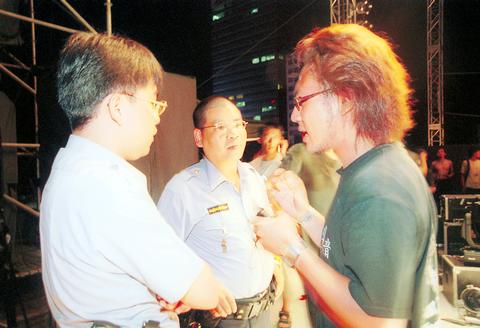
Sunday afternoon, Japan's Garlic Boys became an instant crowd favorite and local Taiwanese bands proved their metal: Celluloid indoors, Chairman outdoors and later Echo gave a stirring performance at the indoor stage. And all of this was only a prelude to the festival's raging climax, the appearance of Megadeth, who were scheduled to perform late Sunday night.
So, has the Taiwanese rock scene finally come of age? The festival's main organizer, Freddy (
"We had a lot of Japanese bands that wanted to come and we had to turn several away," he said. "We hope we can bring them over in future, in addition to other western bands. It'll be both an inspiration and a boost to the local scene."
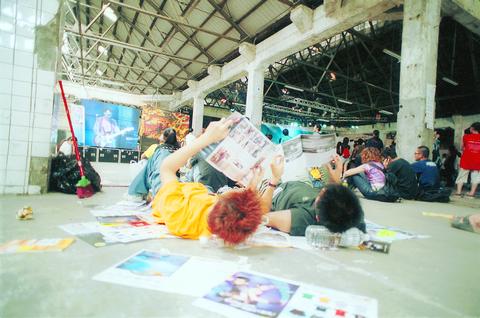
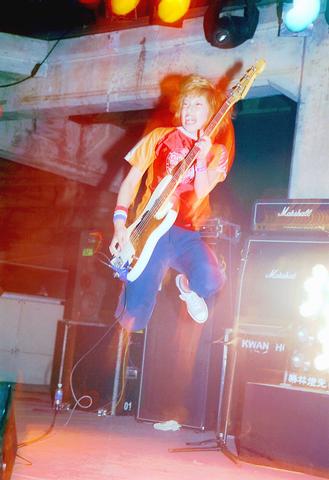
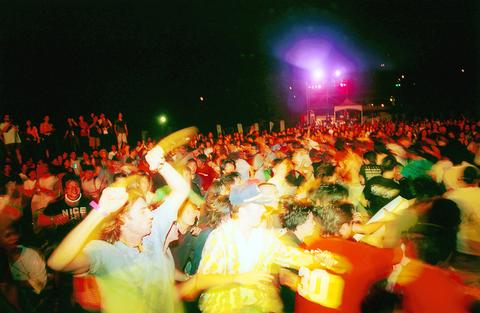


June 9 to June 15 A photo of two men riding trendy high-wheel Penny-Farthing bicycles past a Qing Dynasty gate aptly captures the essence of Taipei in 1897 — a newly colonized city on the cusp of great change. The Japanese began making significant modifications to the cityscape in 1899, tearing down Qing-era structures, widening boulevards and installing Western-style infrastructure and buildings. The photographer, Minosuke Imamura, only spent a year in Taiwan as a cartographer for the governor-general’s office, but he left behind a treasure trove of 130 images showing life at the onset of Japanese rule, spanning July 1897 to

One of the most important gripes that Taiwanese have about the Democratic Progressive Party (DPP) is that it has failed to deliver concretely on higher wages, housing prices and other bread-and-butter issues. The parallel complaint is that the DPP cares only about glamor issues, such as removing markers of Chinese Nationalist Party (KMT) colonialism by renaming them, or what the KMT codes as “de-Sinification.” Once again, as a critical election looms, the DPP is presenting evidence for that charge. The KMT was quick to jump on the recent proposal of the Ministry of the Interior (MOI) to rename roads that symbolize

On the evening of June 1, Control Yuan Secretary-General Lee Chun-yi (李俊俋) apologized and resigned in disgrace. His crime was instructing his driver to use a Control Yuan vehicle to transport his dog to a pet grooming salon. The Control Yuan is the government branch that investigates, audits and impeaches government officials for, among other things, misuse of government funds, so his misuse of a government vehicle was highly inappropriate. If this story were told to anyone living in the golden era of swaggering gangsters, flashy nouveau riche businessmen, and corrupt “black gold” politics of the 1980s and 1990s, they would have laughed.

In an interview posted online by United Daily News (UDN) on May 26, current Chinese Nationalist Party (KMT) Chairman Eric Chu (朱立倫) was asked about Taichung Mayor Lu Shiow-yen (盧秀燕) replacing him as party chair. Though not yet officially running, by the customs of Taiwan politics, Lu has been signalling she is both running for party chair and to be the party’s 2028 presidential candidate. She told an international media outlet that she was considering a run. She also gave a speech in Keelung on national priorities and foreign affairs. For details, see the May 23 edition of this column,